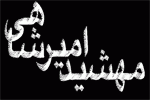Mahshid Amir-Shahy occupies a place of choice in the gallery of Iranian authors. She started her career early in life and soon hailed by art critics for her precocious talent as well as the high quality of her writings. Her refined style, which became more and more sophisticated from book to book, promoted her to one of the most prominent figures of contemporary Persian literature. She has also been a very prolific translator, introducing works of authors vastly differing from one another, such as Laurence Durell and James Thurber, to the Persian audience.
Her lucid, colourful, precise and sensitive style is as much suited to brush her characters as is in painting their surrounding world. The brilliance of her writing is partly due to her vast vocabulary and generosity of vernacular. She builds her characters up through their hold of the language and their dialogues, constructed with mastery unequalled in Persian literature of our time.
The diversity of Mahshid Amir-Shahy’s works makes it impossible to classify her under any of those categories that befit so well other Iranian writers. Her force of character and artistic rigour have kept her from following the literary or political fashions that every now and again shake and shape the intelligentsia of Iran. She has always stayed aloof from the bustles that may bring quick and ephemeral fame for satisfying the demands of a migratory public, but at the end prove fatal to the artistic essence of the work.
Her ties with literature and politics remind one of those of André Gide. As devoted as the latter to creating literature of great value, she does not hesitate to intervene in crucial public issues. She also has the courage to take a firm stand, at times very unpopular, as did Gide in the case of Dreyfus, or when faced with communism, or during the occupation of France.
At the dawn of the revolution that brought Khomeiny to power, Mahshid Amir-Shahy’s deep respect for human dignity, so palpable in her writings, made her take publicly position against the effervescence of fundamentalism and fend for the slender chance of a secular democracy with all her might. This standpoint forced her into exile, where she kept on writing her novels as well as her fight against the Islamism.
To cite but one of her notable political stands is the case of Salman Rushdie and her instigation of the declaration of the Iranian intellectuals and artists in defence of the British author. This declaration received a worldwide echo as well as a most fiery reaction from the Islamises of Iran.
The present trilingual book, in which the actual languages used have been maintained, contains a selection of her lectures, interviews and articles given and written in exile. Her humanism and attachment to promoting a secular democracy in Muslim countries are the leitmotiv of these texts.
Ramine KAMRANE
